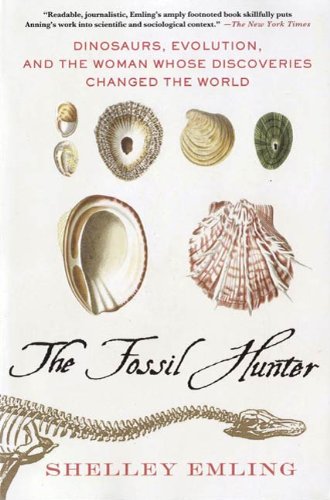The Fossil Hunter: Dinosaurs, Evolution and the Woman whose discoveries changed the World
By Shelley Emling

Mary Anning was clearly one of the most significant characters of eighteenth century science and possibly of all time, particularly in the realm of palaeontology. I am not sure that she is quite as unknown (certainly in the UK) as the American author this excellent little biography claims, but she certainly should be better known.
This was a working class, uneducated woman, who went on to discover (to name but a few) the first major skeletons of ichthyosaurs and plesiosaurs, and made the first discovery of a pterosaur outside of Germany. And she went on to become an expert on the coastal palaeontology around Lyme Regis.
Dinosaurs, Evolution and the Woman whose discoveries changed the World explains that life was not easy for Mary Anning. The problems she had were threefold: she was a (i) working class, (ii) uneducated, and (iii) female. In the male and class-dominated world of first half of the eighteenth century, these were characteristics that an ambitious scientist could ill-afford to have.
However, despite these obvious disadvantages, Mary Anning became an extremely well-respected person, admired by the top scientists of her time, like William Buckland, Henry De la Beche, Sir Roderick Murchison, Louis Agassiz and Sir Richard Owen. This was a remarkable achievement and testament to her tenacity and intelligence.
The tone of the biography is somewhat strident and this is probably right. The iniquities heaped upon the great fossil collector where great, in comparison to how she might have been treated in today’s, slightly more enlightened times. For example, she was never referred to as the finder of the significant fossil specimens she recovered, but yet was used by the great and the good to provide information and resources to advance their own careers – even by those who clearly admired her.
The author is an American journalist with an obvious interest in feminist icons and Mary Anning is certainly that. The book nicely covers her relatively short life (she died of breast cancer at the age of 47) and certainly gives a feel for what it would have been like to live in the Lyme Regis of the first half of the early 1800s. It is well worth a read.
The Fossil Hunter: Dinosaurs, Evolution and the Woman whose discoveries changed the World, by Shelley Emling, Palgrave MacMillan, New York (2009), 225 pages (paperback), ISBN: 978-02-30611-56-6